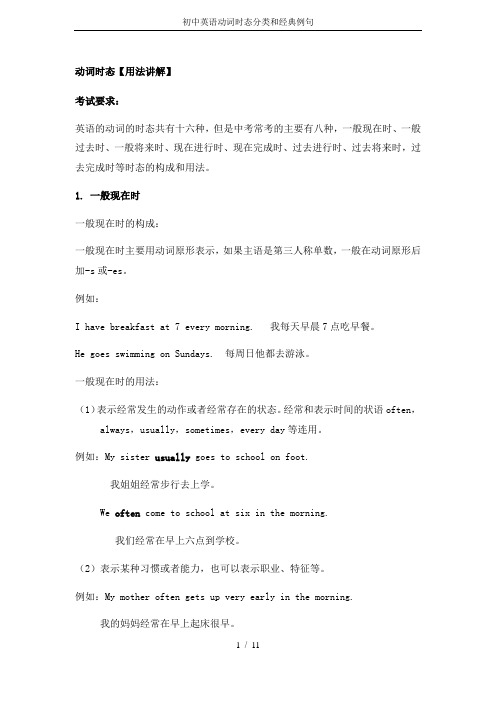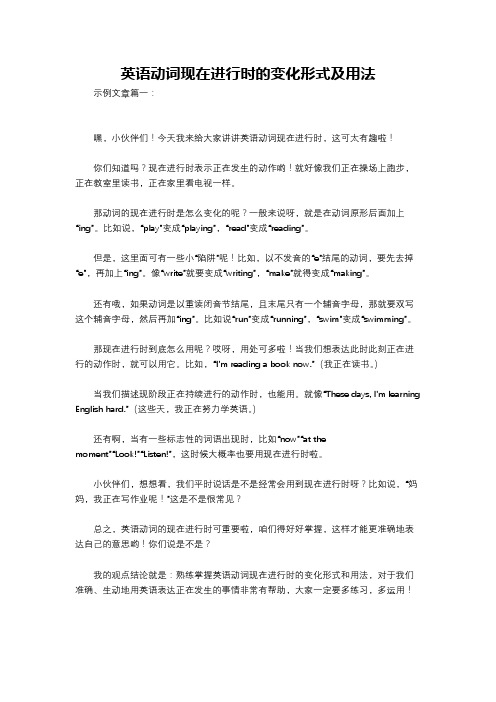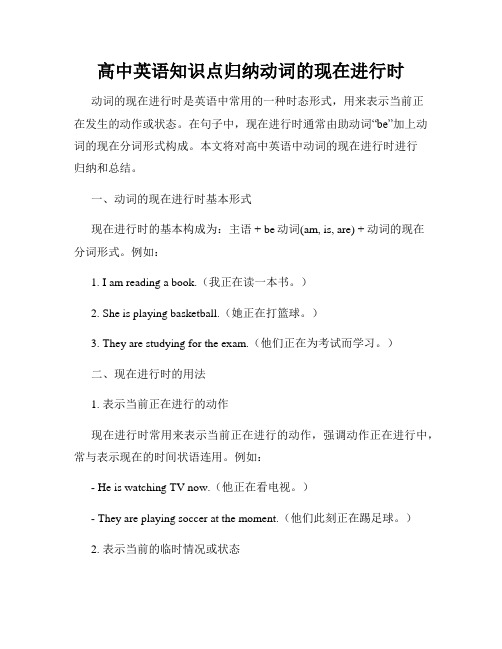【英语学习方法】瞬间动词进行时的用法与意义
初中英语动词时态分类和经典例句

动词时态【用法讲解】考试要求:英语的动词的时态共有十六种,但是中考常考的主要有八种,一般现在时、一般过去时、一般将来时、现在进行时、现在完成时、过去进行时、过去将来时,过去完成时等时态的构成和用法。
1. 一般现在时一般现在时的构成:一般现在时主要用动词原形表示,如果主语是第三人称单数,一般在动词原形后加-s或-es。
例如:I have breakfast at 7 every morning. 我每天早晨7点吃早餐。
He goes swimming on Sundays. 每周日他都去游泳。
一般现在时的用法:(1)表示经常发生的动作或者经常存在的状态。
经常和表示时间的状语often,always,usually,sometimes,every day等连用。
例如:My sister usually goes to school on foot.我姐姐经常步行去上学。
We often come to school at six in the morning.我们经常在早上六点到学校。
(2)表示某种习惯或者能力,也可以表示职业、特征等。
例如:My mother often gets up very early in the morning.我的妈妈经常在早上起床很早。
This kind of car runs very fast.这种小汽车跑得非常快。
(3)表示客观事实、客观规律或者客观真理。
例如:This kind of trees never grows in the desert.这种树从来不在沙漠里生长。
Do you know that knowledge is power?你知道知识就是力量吗?(4)在时间、条件、让步等状语从句中,表示将来的动作。
例如:They’ll be so happy when I tell them.我告诉他们时,他们会很高兴的。
If you aren’t here on time tomorrow, I’ll write to your parents.如果你明天不准时到,我就给你父母亲写信。
英语动词现在进行时的变化形式及用法

英语动词现在进行时的变化形式及用法示例文章篇一:嘿,小伙伴们!今天我来给大家讲讲英语动词现在进行时,这可太有趣啦!你们知道吗?现在进行时表示正在发生的动作哟!就好像我们正在操场上跑步,正在教室里读书,正在家里看电视一样。
那动词的现在进行时是怎么变化的呢?一般来说呀,就是在动词原形后面加上“ing”。
比如说,“play”变成“playing”,“read”变成“reading”。
但是,这里面可有一些小“陷阱”呢!比如,以不发音的“e”结尾的动词,要先去掉“e”,再加上“ing”。
像“write”就要变成“writing”,“make”就得变成“making”。
还有哦,如果动词是以重读闭音节结尾,且末尾只有一个辅音字母,那就要双写这个辅音字母,然后再加“ing”。
比如说“run”变成“running”,“swim”变成“swimming”。
那现在进行时到底怎么用呢?哎呀,用处可多啦!当我们想表达此时此刻正在进行的动作时,就可以用它。
比如,“I'm reading a book now.”(我正在读书。
)当我们描述现阶段正在持续进行的动作时,也能用。
就像“These days, I'm learning English hard.”(这些天,我正在努力学英语。
)还有啊,当有一些标志性的词语出现时,比如“now”“at themoment”“Look!”“Listen!”,这时候大概率也要用现在进行时啦。
小伙伴们,想想看,我们平时说话是不是经常会用到现在进行时呀?比如说,“妈妈,我正在写作业呢!”这是不是很常见?总之,英语动词的现在进行时可重要啦,咱们得好好掌握,这样才能更准确地表达自己的意思哟!你们说是不是?我的观点结论就是:熟练掌握英语动词现在进行时的变化形式和用法,对于我们准确、生动地用英语表达正在发生的事情非常有帮助,大家一定要多练习,多运用!示例文章篇二:哎呀,同学们,咱们今天来好好聊聊英语里动词现在进行时这个有趣的东西!你们想想,当我们说“我正在写作业”“他正在跑步”的时候,这里面的“正在”,在英语里就是现在进行时啦。
【初中英语】初中英语延续动词与瞬间动词讲解

【初中英语】初中英语延续动词与瞬间动词讲解
【—延续动词与瞬间动词讲解】关于英语中延续动词与瞬间动词的知识学习,希望同学们能很好的掌握下面的内容。
连续动词与瞬时动词
1)用于完成时的区别
表达经验的动词;瞬时动词表示动作的结果,不能与句点的时间状语连用。
例如: i'veknownhimsincethen.我从那时起就认识他了。
(表经历)
2)直到/直到条款的差异
延续动词用于肯定句,表示"做……直到……"瞬间动词用于否定句,表示"到……,才……"。
例如:
他一点也没睡。
他一直睡到10点。
典型例题
1.你不需要描述她。
我经常和她在一起。
a.hadmet
b.havemet
c.met
d.meet
首先,这个问题的最后一句强调对现在的影响。
我知道她的外貌。
你不需要描述它。
同样,有几个
times告知为反复发生的动作,因此用现在完成时。
2.——我在等你。
---oh,notatall.i___hereonlyafewminutes.
a、哈维比恩。
哈比恩。
瓦兹。
威尔
答案a.等待的动作由过去开始,持续到现在,应用现在完成时。
对于以上英语连续动词和即时动词的学习,我希望学生们认真学习英语知识,努力在考试中取得优异成绩。
高中英语知识点归纳动词的现在进行时

高中英语知识点归纳动词的现在进行时动词的现在进行时是英语中常用的一种时态形式,用来表示当前正在发生的动作或状态。
在句子中,现在进行时通常由助动词“be”加上动词的现在分词形式构成。
本文将对高中英语中动词的现在进行时进行归纳和总结。
一、动词的现在进行时基本形式现在进行时的基本构成为:主语 + be动词(am, is, are) + 动词的现在分词形式。
例如:1. I am reading a book.(我正在读一本书。
)2. She is playing basketball.(她正在打篮球。
)3. They are studying for the exam.(他们正在为考试而学习。
)二、现在进行时的用法1. 表示当前正在进行的动作现在进行时常用来表示当前正在进行的动作,强调动作正在进行中,常与表示现在的时间状语连用。
例如:- He is watching TV now.(他正在看电视。
)- They are playing soccer at the moment.(他们此刻正在踢足球。
)2. 表示当前的临时情况或状态现在进行时也可以用来表示当前的临时情况或状态,常常带有暂时性的含义。
例如:- We are staying at a hotel this week.(我们这个星期住在一家旅馆里。
)- She is working as a waitress for now.(她目前暂时当女服务员。
)3. 表示安排好的未来计划现在进行时还可以用来表示已经安排好的未来计划,这时常与表示将来的时间状语连用。
例如:- I am meeting my friends tonight.(我今晚要和朋友们见面。
)- They are going on a trip next week.(他们下周要去旅行。
)4. 表示不满或抱怨现在进行时有时也用来表示不满或抱怨的意思,表示对当前状态或动作不满意。
例如:- Why are you always playing video games instead of studying?(为什么你总是玩电子游戏而不是学习呢?)- She is always talking on the phone and ignoring me.(她总是一边打电话一边不理我。
2019中考英语必考八大时态总结

2019中考英语必考八大时态总结在初中阶段,我们学习到的常用的时态有8种:一般现在时,一般过去时,现在进行时,过去进行时,现在完成时,过去完成时,一般将来时和过去将来时。
一下将对初中阶段英语时态知识要点、考点进行归纳总结,希望能对大家复习备考与解题有所帮助。
.1 一般现在时的用法1) 经常性或习惯性的动作,常与表示频度的时间状语连用。
时间状语:every…,sometimes,ofen,always,usually, twice a week, at…, on SundayI leave home for school at 7 every morning. He watches Tv once a week .2) 客观真理,客观存在,科学事实。
The earth moves around the sun. Shanghai lies in the east of China.3) 表示格言或警句中。
Pride goes before a fall. 骄者必败。
注意:此用法如果出现在宾语从句中,即使主句是过去时,从句谓语也要用一般现在时。
例:Columbus proved that the earth is round..4) 现在时刻的状态、能力、性格、个性。
I don't want so much. Ann Wang writes good English but does not speak well.比较:Now I put the sugar in the cup. I am doing my homework now.第一句用一般现在时,用于操作演示或指导说明的示范性动作,表示言行的瞬间动作。
再如:Now watch me, I switch on the current and stand back. 第二句中的now是进行时的标志,表示正在进行的动作的客观状况,所以后句用一般现在时。
瞬间动词用法总结实用文档

瞬间动词用法总结实用文档(实用文档,可以直接使用,可编辑优秀版资料,欢迎下载)中考瞬间动词用法总结瞬间动词又称非延续性动词,可以有现在完成时态,但不可以接一段时间.若要接一段时间,需要做一些相应的变换。
瞬间动词在完成时态中的否定式可以接一段时间。
如:I haven't bought anything for two months。
常用瞬间动词有:1,come, go,get to,reach,arrive, leave, see,hear2。
buy,sell,open,close, get up3。
join,take part in,begin,start, return,give, borrow, lend4,become,turn, bring,take,die,finish,end,receive, hear from, marry,The spaceship is returning to the earth。
I’m leaving for Hangzhou.Wrong:How long have you left school?How long is it since you left school?How long ago did you leave school?How long have you been away from school?Wrong:He has bought the computer for two months.He has had the computer for two months.He bought the computer two months ago。
It is (has been)two months since he bought the computer.Two months have passed since he bought the computer.I didn’t know it until yesterday。
英语知识 _ 初中英语,延续性动词和瞬间性动词的用法
一、延续性动词延续性动词,表示的动作不但可以延续,而且可以产生持久的影响。
常见的这类动词有:b e,h a v e,ke e p,k n o w,l e a r n,l i e,l i v e,re a d,s i n g,s l e e p,s t a n d,s t a y,w a i t,w a l k,w a tc h等。
延续性动词的用法很广,但常见于现在完成时中的句子中,且常与f o r,h o w,l o n g,s i n c e 等引导的表示一段时间的状语或状语从句连用。
例如:I h a v e l e a r n e d m o re t h a n1000C h i n e s e w o rd s s i n c e I c a m e t o C h i n a.自从来到中国,我已经学会了l千多个汉字。
I h a v e ke p t t h e p i c t u re f o r a b o u t t h re e y e a r s.。
这张画我保存了大约三年二、瞬间性动词瞬间性动词,又称为终止性动词或非延续性动词,它表示的动作不能延续,也就是说动作一旦发生就立即结束,并产生某种结果。
常见的这类动词有:a c c e p t,a r r i v e,b ec o m e,b e g i n,b o r ro w,b re a k,b u y,c a tc h,c l o s e,c o m e,d i e,e n d,f a l l,f i n i s h,g e t,g i v e,g o,j o i n,l e a v e,p u t,re a c h,re c e i v e,sh u t,s t a r t,s t o p等。
用在现在完成时要注意下面三点:①瞬间性动词可直接用来表示某一动作的完成。
例如:T h e y h a v e re a c h e d S h a n g h a i.他们已经到达了上海。
英语中考归纳复习专题:动词的时态
英语中考归纳复习专题:动词的时态【动词的时态】初中阶段学习的时态有以下八种:一般现在时、一般过去时、一般将来时、现在进行时、过去进行时、现在完成时、过去完成时、过去将来时.前六种为常考时态,要掌握各时态的构成、用法以及标志性时间状语.【一般现在时】【考点训练1】1.My father is a teacher and he _________ (teach) in a middle school.2.Yesterday the teacher told us the earth _______ (go) around the sun.3.—When shall we begin our meeting?—We’ll begin it when Helen ___ . ()esB.cameC.will comee4.—How do you usually go to school?—I usually ___ to school on foot. ()A.goB.wentC.was goingD.will go答案:teaches goes A A【一般过去时】要点提醒:“used to+动词原形”表示过去的习惯或状态.如:Mum used to tell us stories.妈妈过去常给我们讲故事.【考点训练2】1.Mike ________ (not go) to bed until 12 o’clock last night.2.He asked if I _____ (be) a student.3.Will you please say it again?I ___ quite ___ you.()A.don’t;hearB.didn’t;hearC.don’t;heardD.didn’t;heard4.He _____ go out with his parents,but now he ____ staying at home alone. ()ed to;is used toB.is used to;used toe to;is used toed to;used to答案:didn’t go was B A【一般将来时】要点提醒:be going to与will的区别1.be going to 指已计划好的事或思考过的意图、打算,will表示未事先思考或未计划而临时做出的决定.如:I’m going to see him tomorrow.我打算明天去看他.(事先经过思考)I’ll answer the door.我去开门.(未经事先考虑)2.be going to可表示客观迹象表明马上要发生的事,而will则表明说话者的主观意愿.如:Look at the clouds.There is going to be a storm.看看这些云,暴风雨就要来了.(客观迹象表明要发生)I hope it will be warm tomorrow.我希望明天会暖和起来.(主观意愿)3.在含有条件状语从句的复合句的主句中,一般用will,不用be going to. 如:I will come if it doesn’t rain.如果不下雨的话,我就来.【考点训练3】1.____ a concert in our school next Saturday. ()A.There isB.There areC.There will beD.There will have2.If they can arrive by 9:00 am,we ___ a meeting.()A.haveB.will haveC.hadD.would have3.He ___ her a beautiful hat on her next birthday.()A.givesB.gaveC.will givingD.is going to give答案:C B D 【现在进行时】【考点训练4】1.They ____________ (have) a math test in the classroom now.2.Look! He ___________ (lie) on the beach.3.—Pass the raincoat to me.It ___ hard now.—Here you are. ()A.rainB.is rainingC.rainedD.will rain4.—Cathy,can you answer the door?I ___ the room.—I’m coming,Mum. ()A.CleanB.cleanedC.have cleanedD.am cleaning答案:are having is lying B D【过去进行时】He was forever com plaining about something.他老是怨这怨那.要点提醒:1.在含有时间状语从句的复合句中,延续时间较长的动作常用过去进行时,另一个短暂性动作用一般过去时.如:When the UFO landed,I was shopping at the clothes store.当UFO落地时,我正在服装店买衣服.2.表示两个延续性动作在过去某一时刻同时进行,不考虑动作的先后顺序,主句和从句的谓语动词都用过去进行时,连词常用while.如:Tom was doing his homework while I was reading a newspaper.我在看报纸时,汤姆在做作业.【考点训练5】1.Mike and I ___________ (play) basketball at that time yesterday afternoon.2.While Mr.Johnson _______________ (work) in the office,the phone rang.3.The girl ___ for the bus when the rainstorm came.()A.waitedB.have waitedC.is waitingD.was waiting4.—Jenny,I called you at nine last night,but you didn’t pick up.—Oh,I ____ a popular program called Go Fighting!.()A.watchB.watchedC.was watchingD.am watching答案:were playing was working D C【现在完成时】要点提醒:1.have/has been to,have/has gone to与have/has been in(考点讲解详见P74考点1)2.延续性动词与非延续性动词英语中的动词按动作发生的方式、发生过程的长短可分为延续性动词和非延续性动词两种,非延续性动词也可称为短暂性动词或瞬间动词.在现在完成时态中,有时要将非延续性动词转换为延续性动词,这样才能和时间段连用.转换方法如下:(1)将短暂性动词转换为“be+形容词或副词”.请看下表:如:这间商店开门6小时了.The shop has opened for 6 hours.( ×)The shop has been open for 6 hours.( √)(2)有的短暂性动词可以转换为意思相同的延续性动词.请看下表:如:这本书我借了一个月了.I have borrowed the book for one month.( ×)I have kept the book for one month.( √)3.现在完成时与一般过去时的区别现在完成时强调某一动作或状态对现在造成的影响或结果,不能和表示过去的时间状语连用;一般过去时只表示过去的事实,不表示和现在的关系,可以和表示过去的时间状语连用.如I bought a ticket yesterday.我昨天买了一张票.(强调我昨天做的一件事是买票)I have already bought a ticket.我已经买了一张票.(强调我已经有票了,无须再惦记票的事了)4.现在完成时的其他句型【考点训练6】1.—you _____ your homework yet?—Yes.I ______ it a moment ago. ()A.Did;do;finishedB.Have;done;finishedC.Have;done;have finishedD.Will;do;finish2.His father ___ the Party since 1978. ()A.joinedB.has joinedC.was inD.has been in3.Miss Green isn’t in the office.She to the library. ()A.has goneB.wentC.will goD.has been 答案:B D A【过去完成时】had + 过去分词表示在过去的过去发生的动作或存在的状态.I had had three pieces of cake when you arrived.你来的时候我已经吃了三块蛋糕了.表示过去某一动作或状态持续到过去另一时间.The old man had lived in Shanghai for ten years beforeTom came here.汤姆来这儿之前,这个老人已经住在上海十年了.时间标志by the time...,before,when等构成的短语或引导的从句【考点训练7】1.在我们到达电影院之前,电影已经开始了.The film __________ before we _______ to the cinema.2.警察赶到时,小偷已经逃跑了.When the police __________,the thief____________________ .答案:had begun got arrived had run away 【过去将来时】【考点训练8】1.李明说如果布莱恩下个月来中国,他将会很高兴.Li Ming said he ___________ happy if Brian came to China the next month.2.蒂娜说她下周三打算来参加我的生日派对.Tina said she ________________ my birthday party the next Wednesday.答案:would be was going to【中考示例】(2017·广西)If he _____ Guilin,he’ll probably go to Yangshuo. ( )A.visitsB.is visitingC.will visitD.has visited【解析】考查动词的时态.句意:如果他游览桂林,他有可能会去阳朔.if引导条件状语从句时,时态遵循“主将从现”原则,从句中用一般现在时表示将来.【考题热身】1.(2017·甘肃)I promise I ________ (send) you an email to explain all of these tomorrow.2.(2017·甘肃)Be quiet! The patients ______________(sleep).3.(2017·鄂州)Sandy’s grandparents__________________ (marry) for 50 years.4.(2017·台州改编)A true friend always ____________(support) you whenever youare in trouble.5.(2017·宿迁)I ______________(wash) the dishes while my sister was sweeping the floor.6.(2017·云南)—What do you think of your hometown, Kate?—It a lot.It’s more beautiful than before. ()A.has changedB.changesC.will changeD.change7.(2017·武汉)—Linda is not coming for the party tonight.—But she ______!()A.promisesB.promisedC.will promiseD.had promised8.(2017·毕节)It’s nice to see you again.We ___ each other since 2016. ()A.won’t seeB.haven’t seenC.don’t seeD.didn’t see9.(2017·黔东南)If it doesn’t rain this weekend,we ___ a picnic in the Jinquan Park. ()A.haveB.will haveC.have hadD.had10.(2017·上海)Some exchange students ___ with their host families this time yesterday. ()A.are chattingB.will chatC.were chattingD.have chatted11.(2017·重庆B卷)—Where is your uncle?I haven’t seen him for a long time. —He _____ Beijing for about half a year.He moved there in January. ()A.has gone to B.has been toC.has arrived inD.has been in12.(2017·重庆B卷)John and I ___ to visit his grandparents last Sunday afternoon. ()A.goB.wentC.will goD.have gone13.(2017·重庆A卷)In the past few years,many schools ____ the ways of doing morning exercises. ()A.changeB.changesC.will changeD.have changed14.(2017·重庆A卷)As soon as the rain _____ ,they will go out to pick apples. ()A.stopsB.stoppedC.will stopD.is stopping15.(2017·河北)Don’t take the dictionary away.I ___ it. ()eedC.am usingD.have used答案:will send are sleeping have been married supports A B BBCDBDAC。
瞬间动词
使用瞬间动词(momentary verb)要注意的几个问题瞬间动词表示的行为或过程是短暂的,也就是瞬时间就能完成的动作或行为,这类动词常见的有:die, join, come, go, leave, become, put, open, close, jump, hit, receive, borrow, see, knock, nod, start, return, begin, fall等,使用以上动词要注意以下几点:1.瞬间动词的否定式才能与for或until等引导的一段时间状语连用,而它的肯定式则不能。
e.g.I haven’t received his letter for half a year.This reaction didn’t start until the next morning.I haven’t seen you for a long time.She hasn’t come here for half a month.2.瞬间动词不能用来表示状态或长久的动作,反过来状态动词和长久动词也不能用来表示短暂的动作。
e.g.This book has been lying on the desk for over a week. (不能用动词put, 而用lie来表示,put是瞬间动词,不能与表示一段时间状语连用。
)He wore this overcoat all the time last winter. (这句话表示一种状态,而不是穿的动作,所以用wear 不用put on。
)Mary didn’t fall asleep until four o’clock in the morning. (睡着是一个短暂的动作,所以用瞬间动词fall, 不用长久动词sleep。
)3.瞬间动词的肯定式与表示一段时间的状语连用,要用下列表达形式:1)用瞬间动词的过去时 + 一段时间状语 + agoMy father died over three years ago.He joined the Army twenty years ago.She left here several days ago.2)用It is / has been + 一段时间状语 + since从句(瞬间动作用过去时)It is forty-four years since I came to Wuhan.It is three months since she joined the Army.3)用have / has been + 某些形容词/ 副词/ 名词 / 介词短语 + for引导的时间状语[误] He has joined the Party for thirty-three years.[正] He has been in the Party for thirty-three years. = He has been a Party member for thirty-three years. = He joined the Party thirty-three years ago. = It is thirty-three years since he joined the Party.[误] My mother has died for five years.[正] My mother has been dead for five years. = My mother died five years ago.= It is five years since my mother died.[误] She has returned for two weeks.[正] She has been back for two weeks.[误] The film has already begun for ten minutes.[正] The film has already been on for ten minutes.[误] Mr. Liu has left for Beijing for one week.[正] Mr. Liu has been off to Beijing for one week.4)将瞬间动词换成另一个意义与之相近的持续性动词:[误] He has borrowed the book for a week.[正] He has kept the book for a week.。
高中英语语法必备之谓语动词的时态和语态详解
高中英语动词的时态语态详解在英语中,句子不仅有时间状语说明动作发生的时间,其谓语动词本身也有形式的变化来指示时间,这种表明谓语动词发生时间的动词形式称为时态。
语态是表现主语和谓语关系的另一种动词形式。
一动词的时态一般说来,发生在现在的事情用现在的时态进行描述;发生在过去的事情用过去的时态进行描述;将要发生的事情用将来的时态进行描述。
英语中的时态共计16种,但常用的有11种。
(以动词do 为例)1.一般现在时(do/does);2.一般过去时(did);3.一般将来时( will do/ shall do);4.一般过去将来时( would do/should do);5.现在进行时( am/is/are doing);6.过去进行时(was/were doing);7.将来进行时( will/shall be doing);8.现在完成时(have/has done);9.过去完成时( had done);10.将来完成时( will/shall have done);11.现在完成进行时( have/has been doing);1.一般现在时(1)一般现在时是描述现在或经常性的性质、动作或状态的时态常用时间状语:sometimes, often, always, usually, seldom,every day / night / week / month / year, in the morning, in the afternoon, in the evening, at night(2)表示经常发生的动作,习惯性的动作或存在的状态I usually get up at four every morning when it’s still dark.He always goes to work late,which makes his boss angry and disappointed.(3)客观真理,客观存在,科学事实及自然现象The sun rises in the east and sets in the west every day.The man who has never been to the Great Wall is not a real man.Trees turn green in spring. Liquid turns into gas when it is hot enough.(4)表示格言或警句中Pride goes before a fall.Knowledge is power.Practice makes perfect.(5)一般现在时表将来表示已经计划、安排好了或时间表上所安排,并且一定要做的事情。
- 1、下载文档前请自行甄别文档内容的完整性,平台不提供额外的编辑、内容补充、找答案等附加服务。
- 2、"仅部分预览"的文档,不可在线预览部分如存在完整性等问题,可反馈申请退款(可完整预览的文档不适用该条件!)。
- 3、如文档侵犯您的权益,请联系客服反馈,我们会尽快为您处理(人工客服工作时间:9:00-18:30)。
【英语学习方法】瞬间动词进行时的用法与意义■表示反复或重复
英语的现在进行时用于少数瞬间动词可以表示不断重复的动作,这类动词主要有jump,knock,kick,hit,nod,tap,wink,cough,shoot,drop等。
如:
someoneisknocking.有人呼救。
johnisnoddinghishead.约翰频频点头。
heisjumpingupanddown.他上下地冲着。
whyissheblinkinghereyes?她为什么老眨眼睛?
如果主语为复数,某些动词的现在展开时往往存有“不断”或“一个直奔一个”的含义,例如:
peoplearedyinginthatpartoftheworld.在那个地方人们不断地死去。
menaredroppingwithmalaria,dysenteryandsimplestarvation.士兵们由于疟疾、痢疾或仅仅因为饥饿一个直奔一个地好像了下去。
■表示即将发生
特别注意有些瞬间动词的现在展开时并不表中动作的重复,而是表中动作即将出现。
例如:
they’rehavingapartynextweek.下星期他们将开一个晚会。
mysisterisgettingmarriednextdecember.我妹妹十二月成婚。
you’reyoungpeople.youateonlybeginningtolive.你们是年轻人,刚刚开始生活。
■则表示即将完结
有些瞬间动词的现在进行时则表动作即将结束,如:
iamfinishing.我快略过了。
itisceasingtorain.雨快停了。
thefruitisripening.这果子快熟了。
itwasmypainfuldutytotellhimhewasdying.要我把他即将去世的事告诉他,这使我十分为难。
